English Words in Action, Group G
(a variety of English words which have developed through history and are currently used in our modern age)
Simply click on this banner (or the following link) and you will be on your way to stimulate your brain for greater word comprehension with quizzes based on some of the words in this unit.
2. A blundering social error; a "faux pas": Trisha realized that she had committed an embarrassing gaffe when she mispronounced the name of the diplomat's wife during the introduction.
3. A blatant mistake or misjudgment: It is a serious gaffe to forget to lock one's house when he or she leaves home.
A White House gaffe irritated diplomats who were forced to cool their heels.
Several foreign diplomats were mistakenly denied entry to the White House when they arrived for an annual reception, and though most finally made it in, a few left in anger.
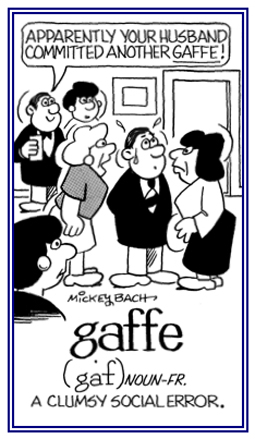
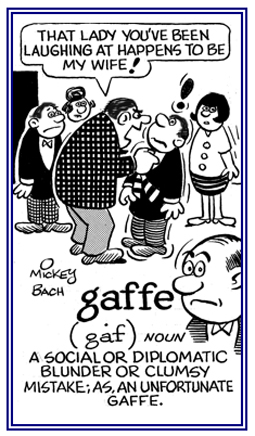
Go to this Word A Day Revisited Index
so you can see more of Mickey Bach's cartoons.
The term galore is always used after a noun, not in front of it.
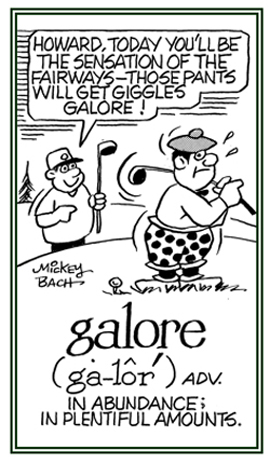
Go to this Word A Day Revisited Index
so you can see more of Mickey Bach's cartoons.
2. A complete or entire range of anything: Mary's feelings about the singing contest ran the gamut from hope to despair.
3. Etymology: Guido of Arezzo, an 11th-century musician and a monk, called the first line of his bass staff gamma and the first note in his scale ut, which meant that gamma ut was the note written on the first staff line.
Over the years, gamma ut was shortened to gamut; however, the scale of its meaning expanded to cover "all the notes of Guido's musical scale", then "all the notes in the range of a musical instrument", and finally, "an entire range of anything".
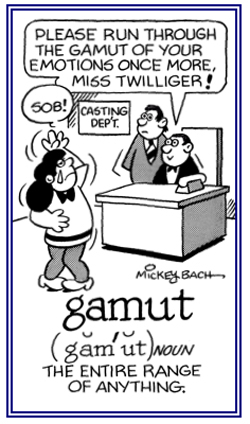
Go to this Word A Day Revisited Index
so you can see more of Mickey Bach's cartoons.
There was a large gap in the wall where the artillery shell exploded.
2. A pass or access through large steep hills: When Tim and his friends were exploring a geographic region, they were able to walk through a gap in the mountains so they could see what was on the other side.3. A space between objects or points; an aperture: Shirley had an abnormal gap between her two front teeth.
4. A conspicuous difference or imbalance; a disparity: There was a big gap between Sue's income and her spending during the last month.
2. To involuntarily open the mouth wide, as the result of hunger, sleepiness, or absorbed attention: Greg was so sleepy after staying up for more than 24 hours, that he gaped, or yawned, right in front of some strangers!
3. To open or to become wide open: The curtains in the children's bedroom were gaped and so they could see the stars and the moon in the sky while they were in bed and before they fell asleep.
4. To open the oral cavity; especially, of feathered creatures: The baby birds were gaping as their mother thrust food into their beaks.
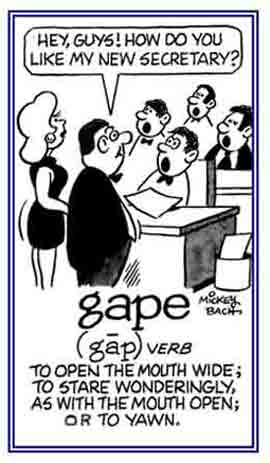
Go to this Word A Day Revisited Index
so you can see more of Mickey Bach's cartoons.
Jack and Jill bought a gargantuan house with the money they inherited from her parents which consisted of at least twenty-five rooms.
2. Etymology: derived from garganta, Spanish for "gullet" and French gargouille, "throat".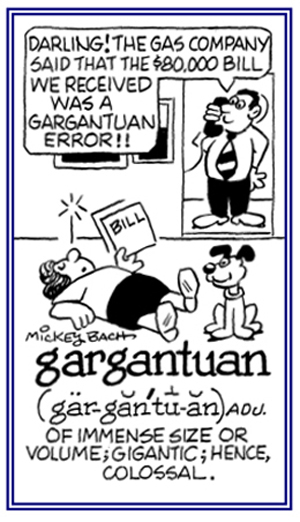
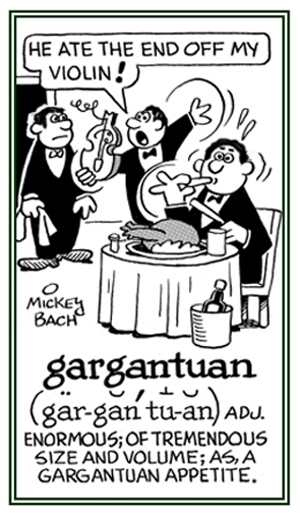
Go to this Word A Day Revisited Index
so you can see more of Mickey Bach's cartoons.
2. Etymology: from Old French garison, "fortification"; formed from garir, "to defend"; ultimately from a prehistoric German word meaning "to protect".
The sense of "fortress" and then of being a "detachment of troops" in a garrison developed in the 15th century.
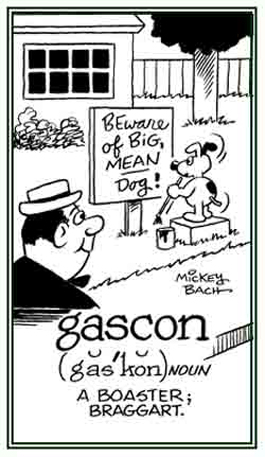
Go to this Word A Day Revisited Index
so you can see more of Mickey Bach's cartoons.
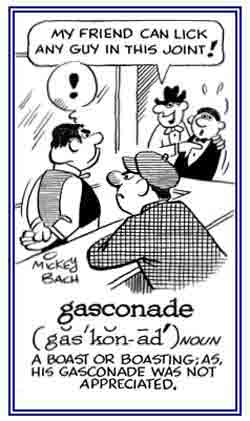
Go to this Word A Day Revisited Index
so you can see more of Mickey Bach's cartoons.
2. Conveying or showing a lack of awareness about the proper way to behave with other people: Others thought that Joe displayed his gauche attitude when he asled the older woman, whom he just met, how old she was.
Mike showed his gauche behavior when he spoke to the president of the company as "Old Buddy".
3. Etymology: "awkward, tactless"; from French gauche, "awkward, left-handed, left"; originally, "awkward, awry" from Middle French gauchir, "to turn aside, to swerve"; from Old French gaucher, "to trample, to reel, to walk clumsily".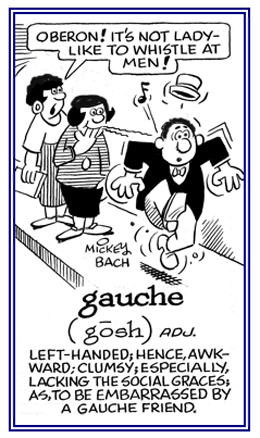
Go to this Word A Day Revisited Index
so you can see more of Mickey Bach's cartoons.
Links to all of the groups of English words in action, Groups A to Z.
You may see the bibliographic list of sources of information for these words in action.

